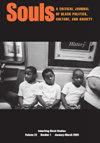The Burning House: Revolution and Black Art
IF 0.1
4区 哲学
Q4 ETHNIC STUDIES
引用次数: 0
Abstract
In a 1961 radio discussion about Black art and its relationship to Black nationalism, Lorraine Hansberry asked: “Is it necessary to integrate oneself into a burning house?” James Baldwin quoted Hansberry in The Fire Next Time without citing her—words that circulated widely in the Black liberation movement. Variously attributed to Malcolm X, Baldwin, and King, Hansberry’s role in this literary political genealogy has been unacknowledged. She was riffing on Malcolm X’s idea of Islam as a “flaming fire.” But he also developed his parable of the master’s house on fire after Baldwin quoted Hansberry’s words, using the burning house as a symbol of revolution, class struggle, and the relationship between property and citizenship rights in a racial capitalist system. That Malcolm X influenced the Black Arts Movement is widely acknowledged, but he also read, listened to, and conversed with leftist artists, writers, and intellectuals that influenced the development of his own thought and rhetoric. This article explores the call and response between these intellectuals, their critique of integration, and call for a radical Black art—looking at Hansberry’s seminal contribution to these debates.燃烧的房子:革命和黑色艺术
本文章由计算机程序翻译,如有差异,请以英文原文为准。
求助全文
约1分钟内获得全文
求助全文

 求助内容:
求助内容: 应助结果提醒方式:
应助结果提醒方式:


